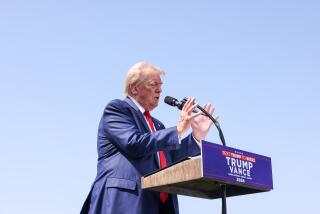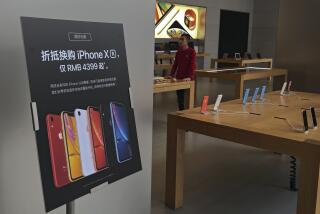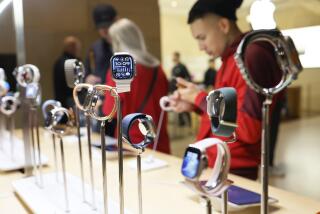Apple Watch unveiling shows CEO Tim Cook’s time has come
- Share via
Reporting from cupertino, calif. — When Tim Cook took to the stage to announce the “next chapter in Apple’s story,” he could have been talking about himself.
Since he succeeded the late Steve Jobs as chief executive three years ago, tech fans, analysts and Wall Street have waited for the day when Apple would finally feel like Cook’s company. Now that he has debuted the first brand-new product category under his leadership — a smartwatch called the Apple Watch — many say his time has come.
“This has got Tim’s fingerprints all over it. He’s clearly the one who guided and directed this,” said Tim Bajarin, a longtime tech analyst who was at Tuesday’s Apple event. “I think a little bit of Steve is still in there, but this is basically now Tim’s project, and he’ll be judged on its success.”
This was a pivotal day for Cook. A business operations man, the 53-year-old had already proved himself capable of keeping the company that Jobs built in sound condition. But sound simply isn’t good enough in a world of fast-paced tech innovation, where the latest gadgets get replaced after a year and some become obsolete in a matter of a decade.
Cook was under pressure to keep the breakthroughs coming, with new products and services that leap ahead of competitors. Many analysts said Cook’s keynote, which was viewed around the globe, proved that the company was in the right hands. (The same can’t be said about Apple’s Web live stream, which repeatedly failed through most of the presentation, including screen freezes, sound muting and a Chinese translator talking over Cook.)
“Apple’s still got it,” said Brian Colello, senior analyst at Morningstar. “If there was any doubt that Apple can innovate, the Apple Watch showed they can.”
The unveiling of the watch elicited thunderous cheers and a standing ovation at the Flint Center for the Performing Arts and could well define Cook’s tenure running one of the world’s most scrutinized companies.
More than profits, sales figures or stock prices, the standard by which Cook was always destined to be judged is far more subjective: Can Apple continue to deliver innovative new hardware? By that measure, the company’s notoriously rabid fans and critics had become restless over Cook’s failure to introduce a new product category since he took charge.
Jobs had generated near-religious devotion thanks to the steady release of products that sparked whole new categories of technology: the iPod, iTunes, the iPhone and iPad. Although other companies had introduced similar devices, it was Apple, under Jobs, that consistently found the right mix of design and features to turn them into mass-market phenomenons.
On Tuesday, Cook sought to prove that Apple still has that magic touch. Although the Apple Watch won’t be available until early next year and starts at a pricey $349, Apple hopes its smartwatch will excite consumers in a way that dozens of other smartwatches introduced this year alone have failed to do.
“It’s worth the wait,” Cook said. “Apple Watch is the most personal device Apple has ever created.”
In introducing the Apple Watch, Cook conjured the stagecraft practiced by Jobs and perfected over the years by Apple executives. He made nods toward Jobs by using, for the first time, Jobs’ famous “… one more thing” line to dramatically introduce the smartwatch nearly an hour into Tuesday’s event. And he recruited U2, the Irish band that had been early backers of Jobs’ efforts to sell the iPod and iTunes, to perform after the keynote ended.
“He was better than he’s ever been on the stage,” tech analyst Bajarin, who attended the 1984 Macintosh and 1998 iMac unveilings at the Flint Center, said of Cook. “He was more personable. In the early days, when he took over initially, he was very — I wouldn’t say robotic, but I would say calculated. He wasn’t very personable; now he’s very personable.”
The fanfare and hype greeting the Apple Watch was so big that it overshadowed the traditional centerpiece of the September product announcements: a pair of new iPhones that, although larger, had few other revolutionary features of note.
The company also introduced Apple Pay, a mobile payment service that appears to mirror rival Google Wallet. Apple Pay enables people to quickly pay for purchases at checkout counters with their iPhones and Apple Watches without digging into their wallets for cash or a credit card.
Cook’s performance Tuesday won’t silence all critics. Several Apple users were quick to point out that the watch was visually unappealing. Alex Gauna, senior analyst at JMP Securities, said the Apple Watch seemed “solid” but not a game changer. And some Twitter users complained that you need to link an iPhone to the Apple Watch for most of the watch’s functions to work, which together could cost close to $1,000.
“It was a good day for Apple, but it fell short of being a great day for Tim Cook,” Gauna said. “It’s progress and solid innovation, but it wasn’t surprises. We didn’t get that one more thing that really surprised us, like Apple TV. We’re still waiting on what the next chapter is for that.”
Wall Street also wasn’t impressed: Shares of Apple fell slightly, ending the day down 37 cents to $97.99 — although analysts said the next-year release date and the wait for new revenue could be a reason. Plus, the introduction of all the major products was widely anticipated and already built into the stock price.
The real test lies with the numbers of watches that Apple can sell. In some cases, iconic products like the iPod and the iPhone were relatively slow to sell at first (the iPad was a blockbuster almost immediately, though its sales now are cooling fast).
“The biggest advantage for the Apple Watch and Apple Pay is there are hundreds of millions loyal iOS users, so they have a much bigger base to sell into,” Morningstar analyst Colello said. “We don’t think [the watch] will sell as quickly as an iPad, but it’ll be interesting to see the long-term growth trajectory.”
Still, with the Apple Watch now revealed, many observers believed that it would go a long way toward reassuring the Apple faithful that the company could still churn out compelling devices. This had been a concern given Cook’s long background in operations and logistics, considered an essential if humdrum part of any business.
Cook grew up in southern Alabama, where he once worked in a paper mill. In college, he studied industrial engineering, then moved up the ranks in operations at IBM and at PC-maker Compaq before Jobs lured him to Apple in 1998.
A personal fitness fanatic always with an eye on efficiency, Cook streamlined Apple’s flabby manufacturing plants and supply chain, then did the same for sales, retail and customer support. He was considered a nuts-and-bolts guy, the one who kept the engine running while Jobs was off inventing cool things.
Everyone expected Cook to continue Apple’s financial discipline and supply-chain excellence, but innovation was another question, one that appears to be quieted — for now.
Twitter: @byandreachang
Chang reported from Cupertino and O’Brien from Toulouse, France. Times staff writer Paresh Dave in Los Angeles contributed to this report.
More to Read
Inside the business of entertainment
The Wide Shot brings you news, analysis and insights on everything from streaming wars to production — and what it all means for the future.
You may occasionally receive promotional content from the Los Angeles Times.











